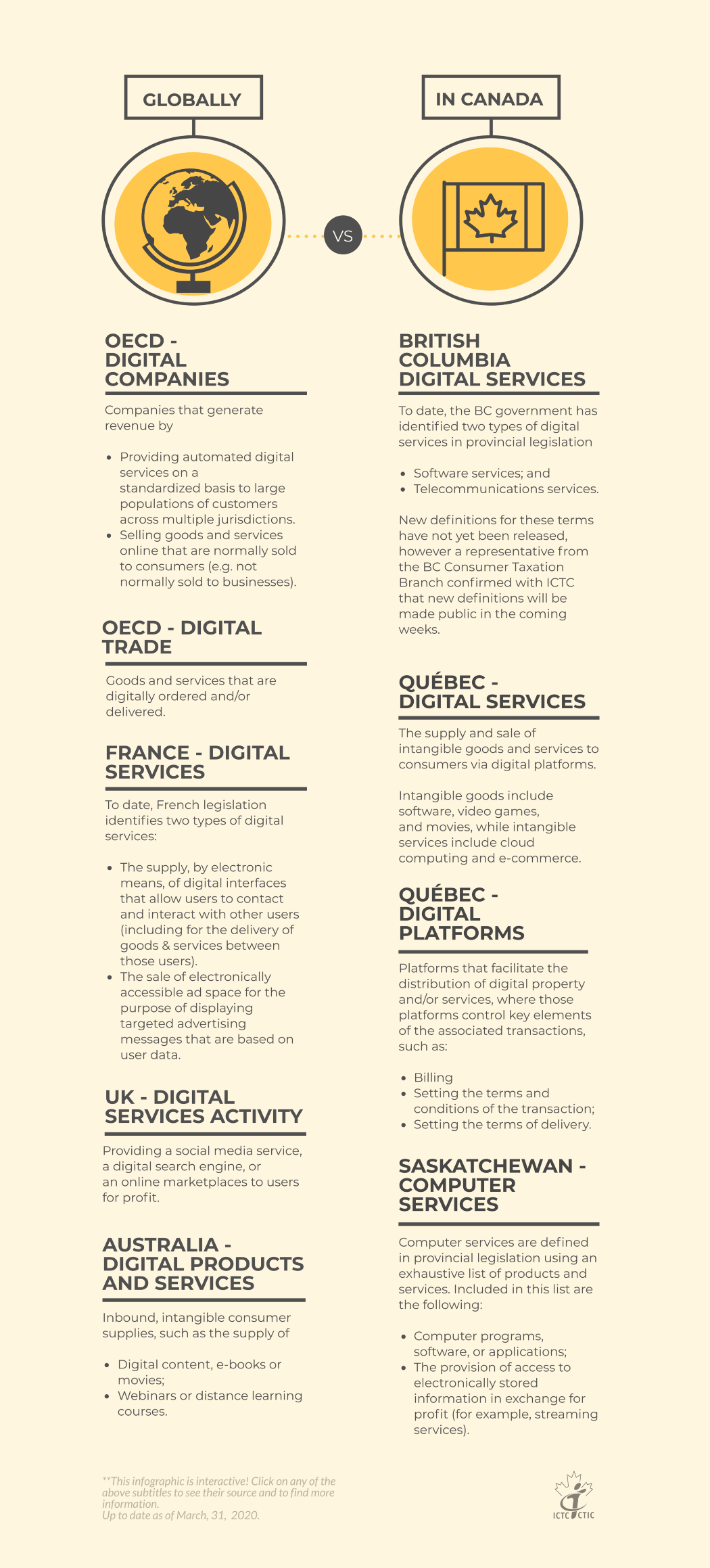When you buy an album from a local store, you expect to pay tax on it. But when you stream that same album on an international online platform, do you know whether tax is collected and by whom?

Taxing digital services, companies, and trade has increasingly been the focus of news stories, policy briefs, and even government legislation in recent years. Some regions — such as Quebec, British Columbia and Saskatchewan — have moved to tax digital services, while others — like the United Kingdom — are considering taxing digital companies themselves. Still, other jurisdictions are choosing to wait and see what happens elsewhere in the world before finalizing their own approach.
With so many moving parts, it can be difficult to keep track of who’s doing what, and what’s happening where. Likewise, with so much new legislation being put in place, it can be hard to pin down exactly what qualifies as a digital service or digital company in each jurisdiction.
With that in mind, this article series seeks to clarify legal terms across various jurisdictions and provide an overview of tax developments in different regions of the world. This article looks at the legal definitions for digital companies and digital services and discusses the arguments for and against charging local sales taxes on goods and services sold via the internet.
What are digital companies and digital services?
Generally, digital companies operate online, delivering a variety of products and services to consumers via the internet. Examples include ride-sharing, content-streaming, social media, and advertising. Digital services, in contrast, are any services delivered to clients and/or consumers via the internet. Digital services can be provided by companies, governments, and even non-for-profits.
Technically speaking, however, the terms digital services and digital companies are subject to many different and competing definitions around the world. Nonetheless, they’ve managed to find their way into the laws and policies of countless governments and organizations, some of which are outlined in the infographic below:

View the interactive version athttps://create.piktochart.com/output/44751006-digital-taxes-infographic
**The term consumer generally refers to individuals who acquire or use goods or services for personal purposes, while the term customer generally includes all recipients of goods or services (including business customers that are not end-users) (OECD, 2019).
What’s all the fuss?
For those in favour of international tax reform, concerns related to digital companies and digital services are two-fold:
- The primary concern is that many digital companies aren’t sufficiently governed by corporate tax law.
Under international agreements, governments can only tax the profits of a non-resident company if that company has a permanent, physical presence in their country. A non-resident company is one that is incorporated or registered in a foreign country. A permanent, physical presence is usually a brick-and-mortar office, factory, or store. This rule dates back to the 1920s, when current international tax law was originally established.
For example, an American or British company would not be required to pay taxes on their business profits in Canada if they did not have a permanent, physical presence in Canada.
The general argument is that this type of agreement made sense in the past, when it was relatively difficult to create value or wealth in a country without having a physical presence in that country. But that no longer makes sense today. In today’s heavily globalized, digital economy, it is easier than ever (and in fact commonplace) for companies to create value or wealth in a country without being physically present.
2. The secondary concern is that the sale of digital services isn’t sufficiently governed by goods-and-services tax law.
In most countries, non-resident companies aren’t required to collect and remit sales taxes for digital services unless they have a permanent and physical domestic presence. This norm was originally established to prevent excessive regulatory burden for governments and multinational companies alike.
In Canada, for example, companies aren’t required to collect and remit federal sales taxes on their digital services if they don’t physically carry out business in Canada (which many digital service companies don’t). Consumers are instead expected to declare any unpaid taxes by submitting a ‘GST/HST Return Form’ at the end of each month (which many consumers don’t).
Proponents of a digital services tax in Canada argue that, under the current tax scheme, Canadian businesses are being put at a disadvantage relative to their foreign competitors, which are not paying sales taxes, while governments miss out on significant tax revenue.
What’s the solution?
As with most policy problems, the appropriate solution depends largely on how you perceive the problem. Those who are in favour of tax reform generally argue the following:
- Multinational, digital companies should be taxed in countries where their wealth/value is created, and not where they are physically located.
- Digitally supplied goods and services should be taxed on par with locally sourced goods and services, irrespective of where the supplying company is located.
On the other hand, those who are against tax reform generally argue that:
- Applying corporate taxes to digital companies based on where they create value/wealth (as opposed to where they are physically located), may result in double taxation. By virtue of being multinational companies with clients and customers all over the world, digital companies tend to create value/wealth in many different countries all at once. As such, they may end up being taxed in many different countries all at once.
- Applying a goods and services tax to digitally supplied goods and services in each jurisdiction is too complex and too much of a regulatory burden for digital companies. Again, by virtue of being multinational companies with clients and customers all over the world, digital companies tend to sell their products and services in many different countries at once. As such, they may have to comply with many different tax systems across each jurisdiction.
Critics argue that without international cooperation, the resulting financial and administrative tax burdens for multinational companies may become unbearable. Similarly, the OECD argues that uncoordinated, unilateral tax measures may undermine the relevance and sustainability of the current international tax framework, potentially damaging global investment and growth.
In closing
The OECD is attempting to reach international consensus and establish a unified approach toward this issue to mitigate some of the above concerns. The organization’s proposal, now open to public consultation, is to re-allocate some profits and corresponding taxing rights from jurisdictions where multinational companies physically conduct business, to where they have their markets. Though unable to do so to date, the OECD’s goal is to establish this unified approach by the end of 2020.
If you enjoyed this article, be sure to check out the next article in this series, which looks at what steps national and sub-national governments around the world have taken on digital taxation.
Likewise, be sure to check out a similar article by Senior Research Analyst Trevor Quan, focused on emerging legislation in the gig economy.
